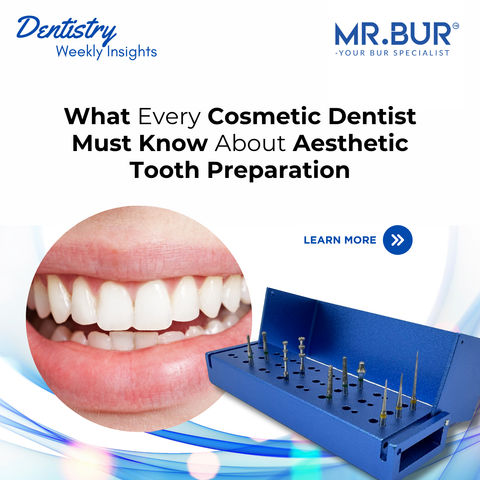Why the Right Restorative Bur Matters
Restorative dentistry demands instruments that deliver absolute precision, durability, and clinical efficiency. Among these, restorative burs play a foundational role in achieving predictable, high-quality outcomes. From the earliest rotary cutting tools to today’s advanced, minimally invasive designs, dental burs have evolved significantly to match the rising expectations of modern clinical care.
At Mr. Bur, we specialize in creating restorative burs that meet the demands of contemporary procedures, ensuring precision without compromising tooth structure.
Classification of Restorative Burs
A. Diamond Burs
Diamond burs utilize industrial-grade diamond particles bonded to a stainless-steel or metal matrix. Their unmatched abrasive strength makes them optimal for cutting hard materials like enamel, ceramic, and composite restorations.
-
Available in a range of grit sizes (super coarse to ultra-fine)
-
Used extensively for finishing margins and beveling enamel
B. Carbide Burs
Manufactured from tungsten carbide, these burs offer superior cutting precision and longevity. Their fluted blade design facilitates efficient caries removal and cavity preparation with minimal vibration.
-
Ideal for initial tooth structure removal
-
Used across Class I, II, and V restorations
C. Steel Burs
Though less commonly used in restorative procedures, stainless steel burs are still relevant in low-speed applications, especially for finishing and smoothing tasks.
Understanding the 330 Pear-Shaped Bur
The 330 bur is a mainstay in restorative dentistry due to its:
-
Pear-shaped head: Ideal for creating rounded internal angles
-
Retentive design: Supports mechanical retention in cavity preps
-
Versatility: Suitable for Class I, II, and V restorations
Carbide vs. Diamond: What’s the Difference?
|
Feature |
330 Carbide Bur |
330 Diamond Bur |
|
Cutting Efficiency |
High-speed caries removal |
Smooth enamel contouring |
|
Heat Generation |
Low (less pulpal risk) |
Higher (requires water cooling) |
|
Clinical Role |
Initial cavity prep |
Finishing and margin refinement |
|
Ideal For |
Dentin removal, retentive undercuts |
Bevels, smooth enamel walls |
Clinical Applications of Mr. Bur 330 Restorative Burs
Class I Cavity Preparation with 330 Carbide
Class I lesions affect occlusal surfaces. Here’s how the Mr. Bur 330 carbide bur delivers precision:
-
Decay Removal: Rapidly eliminates soft and moderate caries.
-
Undercut Creation: The pear shape naturally forms retentive internal angles.
-
Heat Management: Generates minimal heat; water spray enhances safety.
Clinical Tip: Maintain a consistent angle and use a light, sweeping motion for conservative cavity design.
Class II Cavity Refinement with 330 Diamond
When working on interproximal decay, precision is critical. The Mr. Bur 330 diamond bur provides:
-
Enamel Smoothing: Ensures a clean, bondable surface.
-
Proximal Box Shaping: Helps contour the box for ideal composite adaptation.
-
Beveling: Increases adhesive surface area and restoration longevity.
Clinical Tip: Use with water spray and light pressure to avoid enamel damage.
Class V Lesion Management Using Both 330 Burs
Class V cavities near the gingival margin demand careful handling:
-
Carbide First: Gain access without harming soft tissue.
-
Diamond Second: Smooth internal walls and bevel enamel for aesthetic, functional restorations.
Restorative Materials: Composite resin or glass ionomer cement are typically used post-preparation.
The Clinical Edge: Why Mr. Bur Restorative Burs Stand Out
What makes Mr. Bur the trusted choice for dental professionals worldwide?
-
German-engineered tungsten carbide and diamond technology
-
High concentricity for vibration-free rotation
-
Optimized flute design for chip clearance and less clogging
-
Durability: Long-lasting performance with minimal wear
-
Minimally invasive focus: Conserves healthy structure with precision control
Our commitment is to empower dentists with the best tools for effective, efficient, and predictable care.
Restorative Workflow: From Prep to Placement
After cavity prep using the appropriate bur, follow this restorative sequence:
-
Occlusal Reduction (if needed): Ensures proper fit of final restoration
-
Material Selection:
-
Composite: For small to moderate restorations
-
Onlays/Inlays: For moderate defects
-
Crowns: For severe structural loss
-
Finishing & Polishing: Use diamond polishers or fine carbide finishing burs for longevity and aesthetics
Why Premium Burs Matter
Choosing a high-quality bur isn’t just about speed, it’s about outcomes. Studies show that low-cost burs wear quickly, create more heat, require more pressure, and reduce handpiece lifespan. In contrast, premium burs like Mr. Bur maintain cutting integrity over multiple uses, minimize trauma to tissues, and produce cleaner preps for better bonding.
Clinical Insight: A bur that rotates true reduces iatrogenic damage, improves restoration fit, and contributes to patient comfort.
Restorative burs are more than tools, they are critical to successful, conservative treatment. By selecting the right bur for the right procedure, clinicians can improve their clinical outcomes, reduce chair time, and enhance patient satisfaction. Mr. Bur offers a full line of 330 carbide and diamond burs that meet the highest demands of restorative dentistry.
Diamond Burs, Carbide Burs, Surgical & Lab Use Burs, Endodontic burs, IPR Kit, Crown Cutting Kit, Gingivectomy Kit, Root Planning Kit, Orthodontic Kit, Cosmetic Restorative 3-in-1 Kit FG, Composite Polishers, High Speed Burs, Low Speed Burs



